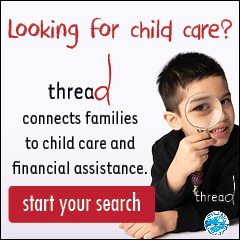
“My family has been totally transformed by fostering,” says Ivy Spohnholz, shown here with her husband, two biological daughters and one foster (now-adopted) daughter.
Foster Parenting:
Could it be right for you?
By Jamey Bradbury
When Ivy Spohnholz was growing up, there was always someone to play with. “For a good part of my childhood, there were the four biological siblings, and there were usually up to four foster siblings,” she describes. “So it was a fun way to grow up. Our house was the place to come and play.”
Ivy and her husband decided early on that they would emulate her parents by taking in foster children. They are one of the 500 families in Anchorage licensed to care for what the state terms “out-of-home” children, or kids who have been removed from their family homes. That might sound like a lot, but in Anchorage alone, about 1,200 children require placement in a foster home each month.
“Unfortunately, we’re bringing children in at a high rate,” says Tandra Donahue, a foster care licensing manager for the Office of Children’s Services (OCS). “We want to match children with the foster families that can best meet their need and successfully support that child. But when we’re short on foster homes, we don’t have a lot of flexibility to make those matches.”
The role of foster families
Families who become licensed are responsible for the 24/7 care of children who can’t live with their biological families, often because the home has become unsafe or the child is at risk of mistreatment. “It takes a special family to help a child make that journey through a difficult time and return home, or maybe go to a relative or to an adoptive placement,” says Aileen McInnis, director for the Alaska Center for Resource Families (ACRF), which provides support and training for foster families.
Reunification with the biological family is always the goal of foster care. While it can be difficult to let go of a child who has lived with your family a few months, a year or even several years, Ivy says, “that’s where most foster children want to be – back with their bio family. And if you remind yourself that you gave them unconditional love and an opportunity to be part of a healthy family, that’s a gift they can take with them.”
When you decide to foster a child, you won’t be on your own. The state offers support to foster families in the form of a stipend to pay for the child’s needs, like food and toys. Most foster children qualify for Medicaid, and OCS may even partially pay for childcare services.
Common misconceptions
The money received by foster families in the form of a stipend can lead to some misconceptions, though.
“I think a big misperception people have is that foster parents do this kind of work for the money,” explains Aileen. “I always say, if you want to make money, don’t foster; do childcare. You make a whole lot more money and the kids go home at the end of the day!”
Through ACRF, Aileen fields a host of questions from potential foster families, including whether single people, unmarried or gay couples can foster (the answer is yes to all three) and if it’s okay to specify the gender of the child you want (yes) or the age (again, yes, but Aileen encourages foster parents to indicate an age range to increase the likelihood of a placement).
One misconception potential foster families have, adds Tandra, is that having room in their home and love in their hearts is enough. “Those things are important, but there’s a lot more to consider before you make the decision to bring a foster child into your home.”
What it takes
First and foremost, fostering isn’t a decision that only impacts parents; biological children and other family members already in the home will be affected, too. Talk with your family about this decision and think about how each of you will adjust and contribute to a new family dynamic.
“I remember it was very important to me to be the oldest as a child,” Ivy says. “So my mom always made sure she only took kids who were my age or younger.”
Are you willing to take in siblings? Do you work better with teenagers? How will you deal with discipline problems or respond to a child who has experienced trauma? These are all important questions to ask, but perhaps none is more important than this: Is fostering a child right for me? “Some folks are really interested in building their family,” Aileen explains. “In that case, it’s probably best to explore adoption because foster care really is a temporary situation.”
Remember, too, that because fostering is temporary, more people than just your family will be involved. You will work with a licensing worker, a caseworker and, in some cases, a guardian ad litem or the child’s biological family.
Taking the first steps
Once you’ve decided that fostering is right for your family, the first step is taking an orientation offered by ACRF. This is followed by an application process, fingerprinting and a background check for anyone in your home age 16 and older. Finally, an OCS licensing worker will conduct a home visit to determine that basic safety standards are met.
Your responsibilities don’t end after you have been licensed as a foster family. Once a child is placed with you, they may need transport to medical or therapy appointments. There’s also a small amount of recordkeeping to do and some required ongoing training. And there are the surprises and challenges that come with any child.
“We work with the most interesting dynamic: families,” says Tandra. “There are a lot of variables that come with that, and there’s no way to predict what will happen. But the rewards are so much more than the challenges and struggles.”
“My family has been totally transformed by fostering,” adds Ivy. “One thing we know about poverty and violence is that it’s intergenerational, and if you can be part of putting a stop to the transfer of trauma, that can be something that has impact beyond one single child.”









